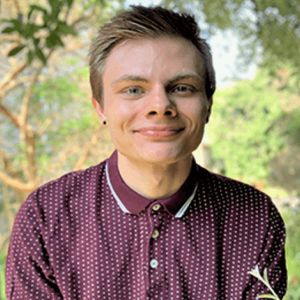
Matthew
Dunham
California State University, Monterey Bay, CA
Matthew is from Bakersfield, in the central valley of California. Unlike what most think of California to be like – it is desert-like with an average temperature of 105 Fahrenheit. He comments that they experience 111 or higher degree temperatures frequently, it’s fortunately a dry heat. Matthew has a big family, with more than 60 people at his family home for this year’s 4th of July celebration. He has 15 cousins, 6 nephews, and a niece on the way – to name a few of his relatives. He is the youngest in his nuclear family at home. Matthew has an artistic side to him, as he plays electric guitar, and enjoys pencil sketches and realism in art.
He became interested in science in the 6th grade, when he remembers watching YouTube videos on science experiments, buying kits and doing experiments at home. He was in an AP statistics course in high school that influenced his decision to major in statistics. He also has a brother with a master’s degree in mathematics, who influenced him as well.
“I’ve participated in two different REUs, and at home I’m in a 2-year research program that prepares students for graduate school, primarily for Ph.D. degrees. This seemed to Matthew to be a good pre-requisite for the RIT REU research work this summer, as he is interested in educational skill sets for improved learning.
His research this summer at RIT (virtually) is in the development of framework for characterizing and assessing computational literacy in different scientific disciplines. He is using analyses of student work and interviews in order to gain a deeper understanding of how the course material is learned. “The best way to do that is to make a model (prediction of outcomes),” Matthew explained. This is an effective tool for solving problems, and assists in learning more about what it means to be literate in computation, what skills are needed, and what social aspects are helpful in communicating to others, etc.
From this framework, Matthew developed a survey to administer to students to see how to improve learning computational skills across disciplines.